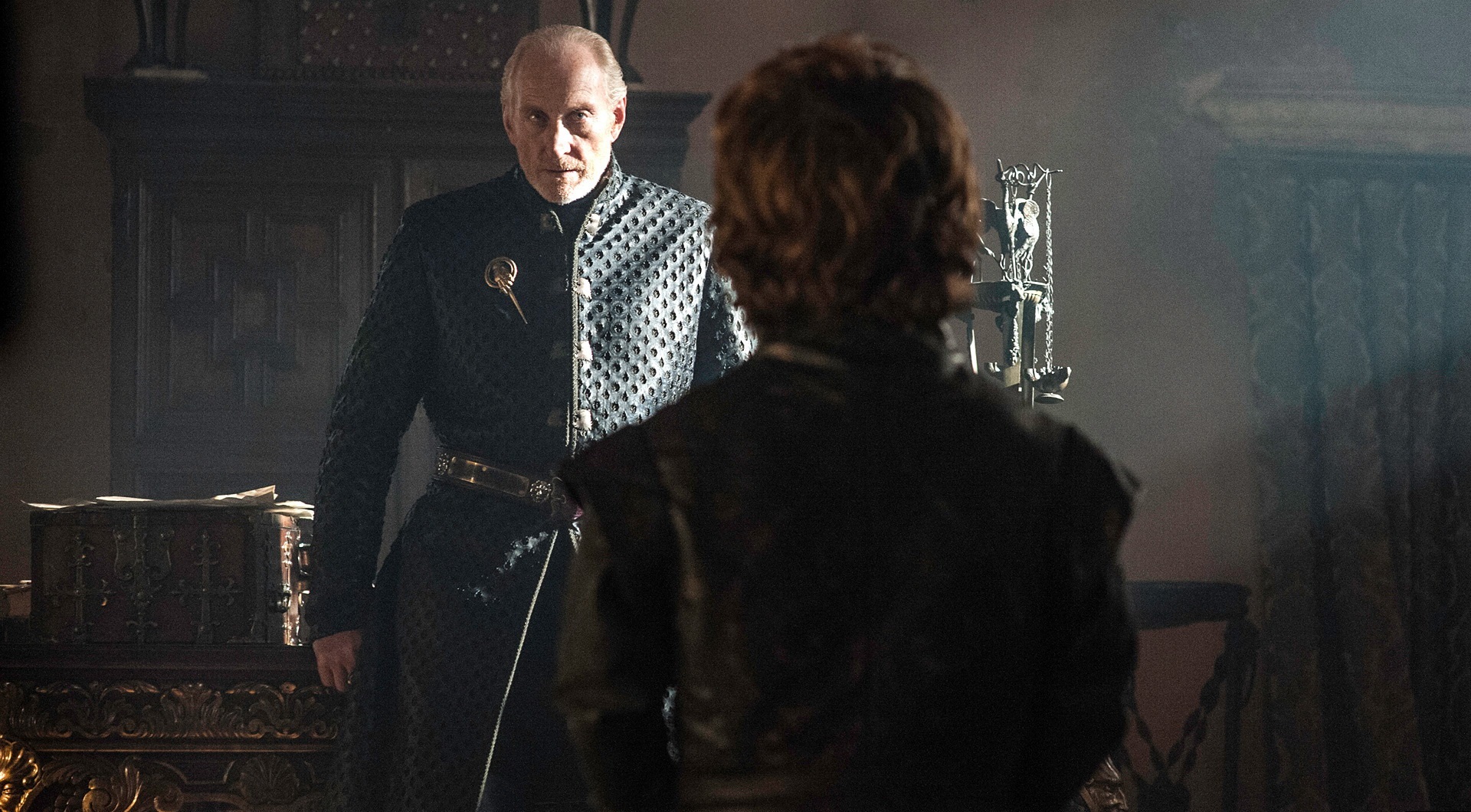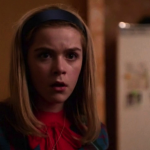“Any man who must say ‘I am the king’ is no true king” —Tywin Lannister.
In every society in which wars are fought (so: all of them) there is an oft repeated appeal to understand the “cost of war.” There are many angles to approach is considering the cost of war. The most literal way would be to calculate the actual monetary price in dollars. Most would then also point to the cost of life where young men and women are killed by the dozens, hundreds, thousands. And the English majors among us would point to the slow denigration of the souls of those involved as a cost of war.
The phrase “the cost of war” is almost always synonymous with someone’s attempts to prove that “cost” is far too much to pay. But in “Mhysa,” Game of Thrones excellent finale to an excellent season of television, the cost of war is a little more complicated.
In “The Rains of Castamere,” the audience was “treated” to one of the most brutal and stomach-churning scenes in television history where a handsome, just, young king watches his wife and unborn child being brutally murdered before he is brutally murdered, himself, in front of his mother, who is also…you know: murdered. “Mhysa” wastes no time in pouring more salt on the wounds. Any viewer who stuck with the show through its darkest moment expecting that things couldn’t get much darker was proven spectacularly and horrifyingly wrong when the Frey bannerman parade Robb Stark’s corpse around on a horse with his dire wolf’s head placed atop his shoulders. I mean…fuck. Jesus…fuck, dude. Robb Stark may be dead, but the tragedy goes far beyond just being dead. He wasn’t killed nobly on the battlefield. He was murdered. He failed. He failed himself, he failed his family, he failed his country, and he was murdered in cold blood by the people he trusts. It was embarrassing and tragic. And then even in death, his body is desecrated and disrespected and held up as a posthumous example to everyone who ever believed in him that their faith was misplaced. It’s about as awful a circumstance that can exist or anyone’s death.
Robb’s death and subsequent humiliation is a cost of war and a cost that seems far too heavy to bear. Until, of course, our old friend Uncle Tywin offers his take. Tywin asks Tyrion which is more tragic: 10,000 more men dying on a battlefield, or a dozen dying at dinner? From a purely statistical standpoint, it is hard to argue for the dozen. Before Harry Truman made the decision to drop the atomic bomb on Hiroshima and Nagasaki, he was counseled on the potential cost of an ongoing war in the Pacific. The number of those killed by the bomb would supposedly be dwarfed by the number of soldiers and civilians killed in an ongoing military conflict with Japan.
Tywin Lannister clearly isn’t Harry Truman and he would have killed every man, woman and child in Westeros not named Lannister if it meant winning the war. But there is at least a logic behind what he says to comfort Tyrion. If two wars are the same in strategy, tactics, and causes, is one war more or less tragic because 34,591 people die in it while 34,592 die in the other? I don’t know. You don’t know. Tywin Lannister doesn’t know. Tyrion Lannister doesn’t know. George R.R. Martin doesn’t know. David Benioff and D.B. Weiss don’t know. Not even Hodor, bless his heart, knows. And that’s what season three of Game of Thrones has pulled off so beautifully: forcing its flawed and human characters to confront the only unpleasant nature of their humanity. If war is an inevitability due to human nature, does it really matter how they are waged? Is the best we can hope for to keep the body count relatively low? Again, I don’t know.
Thankfully, another thing that Game of Thrones is good at is entertainment. Just when you think you’ll never be able to erase the image of Grey Wind’s head on Robb’s body from your mind, you find yourself enjoying Tywin Lannister sending the king to bed without his supper. Game of Thrones, perhaps emboldened by the kinetic and singularly focused nature of last year’s successful “Blackwater” episode, has made a more concerted effort to show, not tell. But the most enjoyable individual scenes from the series are just the characters hashing shit out. That’s why each season finale to date, despite being overshadowed by bombastic penultimate episodes, have been successful: due to their expository nature they inevitably feature more “hashing shit out” scenes per episode than the average Thrones hour. In “Mhysa” we get Tywin assuring Tyrion that respect for one’s family is the only way to achieve power in this world, Tyrion and Cersei speaking of children as a crutch in a cold world. Even Bran, long side-lined to fever-dream ridiculousness with the warging buddies gets an excellent hashing shit out scene with Samwell Tarley of all people.
The best scenes of the episode, however occur just across Blackwater Bay where the Dragonstone crew is confronting a familiar question regarding the cost of war. Stannis and Melisandre truly believe that all it will take to win the war and bring peace to the realm is the death of one bastard boy. This seems to be even more of an open and shut case than the messy (literally) moral landscape of the “Red Wedding.” In their minds, Gendry dies and the realm is saved. Davos, despite not appearing for the majority of the season puts in a nice final word about his central theme where he refuses to even entertain the question of a sacrifice. It may be because Davos is not as intellectual as his high-born peers or it may be that he just have a far more resolute heart but his answer to the question of what is worth sacrificing for peace is “none of the above.”
Most impressively, Theon and the “Boy,” turn in a worthwhile scene. The Theon torture scenes have been problematic for the entirety of the season. It was never clear why the writers chose to include them or why they decided to be so secretive about them. Putting aside the fact, that a healthy percentage of viewers already know what is coming next by virtue of having read the books, it’s not like it was difficult to guess that the “Boy” was Roose’s son or even why we should care. But thankfully with the “reveal” out of the way, Iwan Rheon seems able to finally have some fun with the role of Ramsay Snow. Only on Game of Thrones could the rule of a psychotic torturer be considered “fun,” but it’s hard not to laugh at Ramsay playing with his sausage in front of Theon. It also gives the Ironborn something to do after a full season of doing nothing other than apparently licking their wounds in Pyke. It’s also hard not to think of Cersei’s resigned realization that she cannot control her psychotic son as Roose tells Walder of his own “off” son. I’m sure that’s not going to come back to bite anyone in the ass.
The concept of family has been a driving force throughout the whole series and it has dovetailed particularly nicely with the “cost of war” discussion this season. Despite the fact that it feels like a repeat of season one’s final scene, Daenerys’ crowd-surf around Yunaki is thematically consistent. Everyone in Westeros is all too happy to reveal what they’ve sacrificed for their family but the Mother of Dragons by all appearances is the first character interested in building a family much larger than merely a bloodline.
BULLET POINTS FROM HERE ON OUT
- Another reason I couldn’t get completely into Dany’s freeing of Yunkai was just the “White Man’s Burden” vibe of the whole thing. I don’t mind the racial ambiguity of Essos. Daario, Varys, Shae, Grey Worm and Missandei all come from the same continent and appear to share no similar skin tones or accents or anything. So it’s kind of baffling that all the slaves of Yunkai are exclusively brown-skinned.
- There is one shining moment where it looks like Tyrion and Sansa could be happy together. Obviously it doesn’t last long because this is Westeros.
- Hodor Hodor-ing into a well almost makes up for the Red Wedding.
- Michael McElhatton, who plays Roose Bolton has a very suave speaking voice. He could do voiceover for Game of Thrones online specials or something.
- My favorite dialogue ever spoken on this show:
“I wanted him to have a better life.” “Does he?” “He’s dead.” “How’d he die.” “Following me.” - Love. It’s like being shot by three arrows.
- The final scene with Daenerys crowd-surfing is just what happens every time Emilia Clarke leaves the house to get coffee.
(photo via Fanpop)




